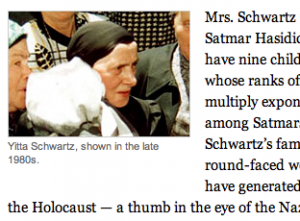 This weekend, the Times brought us the staggering story of Yitta Schwartz, a Holocaust survivor from Hungary who died last week at 93. Mrs. Schwartz, a member of the Satmar Hasidim, had eighteen children, fifteen of whom lived to adulthood. Those fifteen, by and large, were as fecund as their mother, and the Hasidim tend to marry young. All of which added up to this: By the time she died, Yitta Schwartz had great-great-grandchildren, and could count 2,000 living descendants. According to the Times, she made it her business to turn up at every bris, bar mitzvah, wedding, and funeral, and that commitment amounted to a full-time job.
This weekend, the Times brought us the staggering story of Yitta Schwartz, a Holocaust survivor from Hungary who died last week at 93. Mrs. Schwartz, a member of the Satmar Hasidim, had eighteen children, fifteen of whom lived to adulthood. Those fifteen, by and large, were as fecund as their mother, and the Hasidim tend to marry young. All of which added up to this: By the time she died, Yitta Schwartz had great-great-grandchildren, and could count 2,000 living descendants. According to the Times, she made it her business to turn up at every bris, bar mitzvah, wedding, and funeral, and that commitment amounted to a full-time job.
It’s a sharply divisive story. On the one hand, I cannot set aside the destructive nature of fundamentalist religion. Women like Yitta — and women in fundie Christian, Mormon, or Muslim sects — lead a very constrained life, with a huge physical workload and few escapes. The men are usually freer, but not free. They often work within belief systems that in premodern life were reasonable and practical but are now distortions. (Having a couple of dozen kids made more sense when the infant-mortality rate was 70 percent.) And the unbelievable number of children they bear is, arguably, a strain on everyone’s resources, not least their own.
On the other hand, she was a true believer, and appears to have lived without the easy hypocrisy that we “evolved” sorts do. I may be nominally freer than Yitta was, because I can come and go as I please, and have a less exhausting life. Yitta had her God-given mission, and fulfilled it better than just about anyone; I half-succeed at some fraction of what I do, and consider those few occasions triumphs. Simpler and more straightforward (if not necessarily easier) goals have their place, too.

